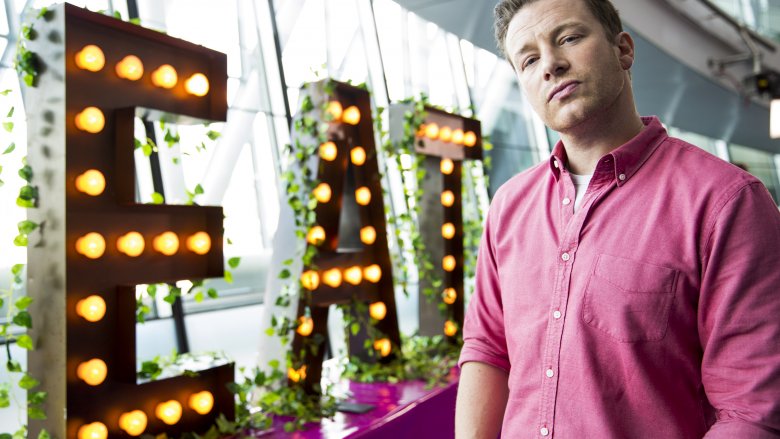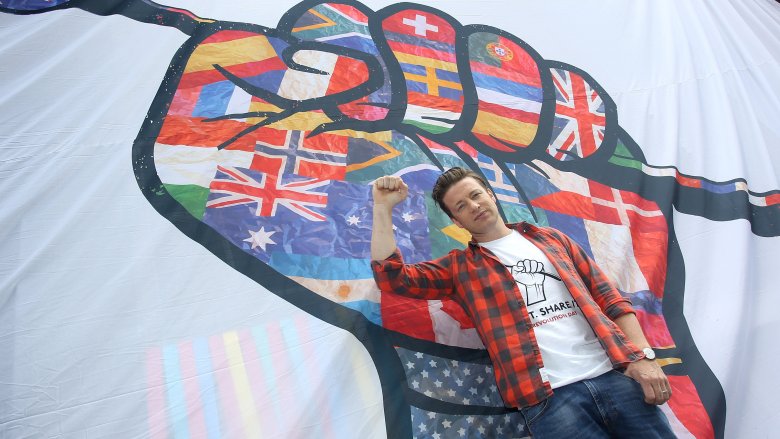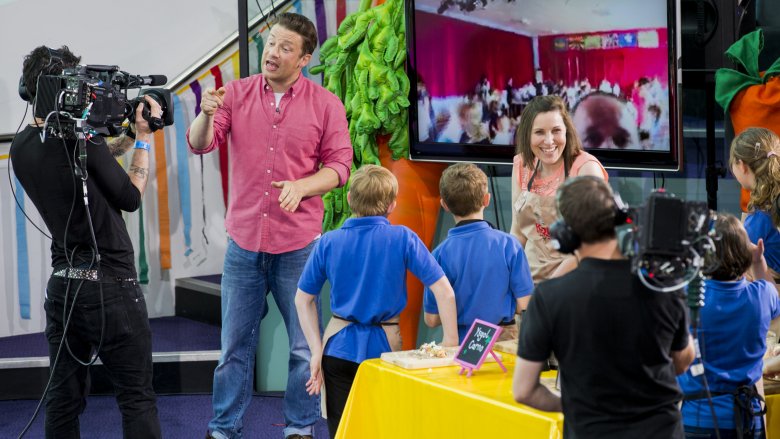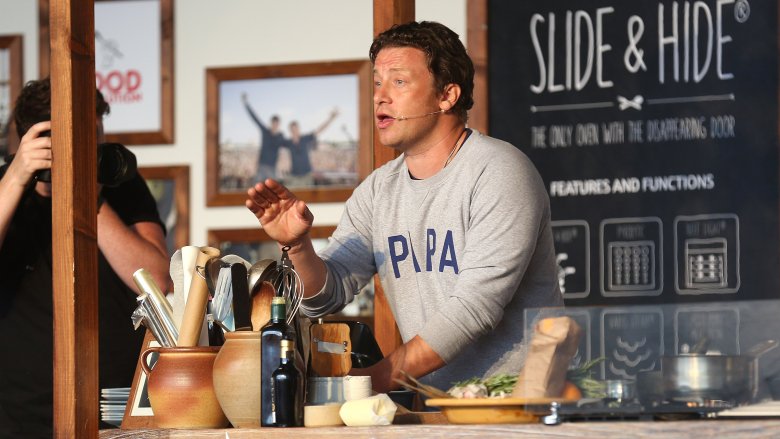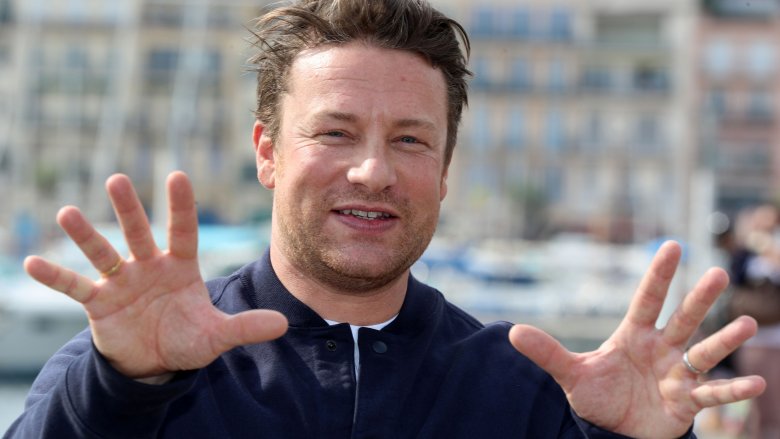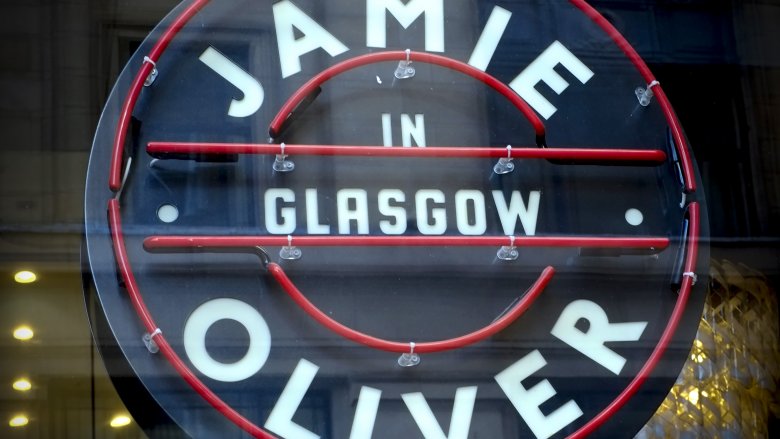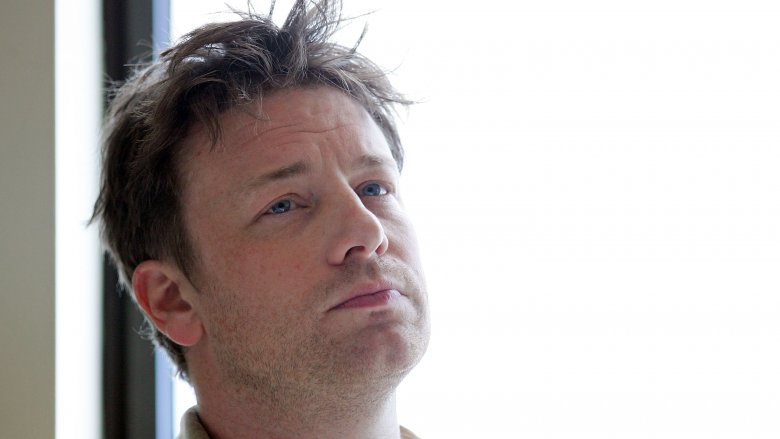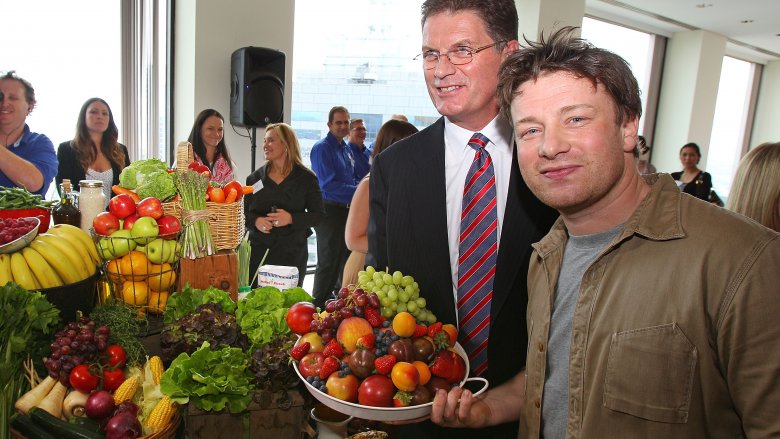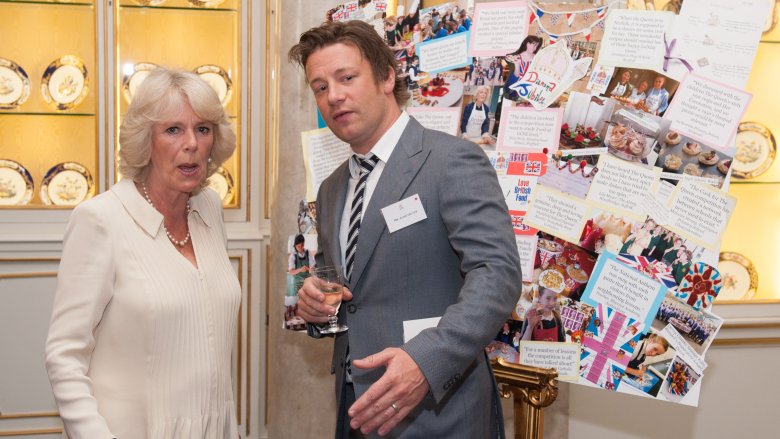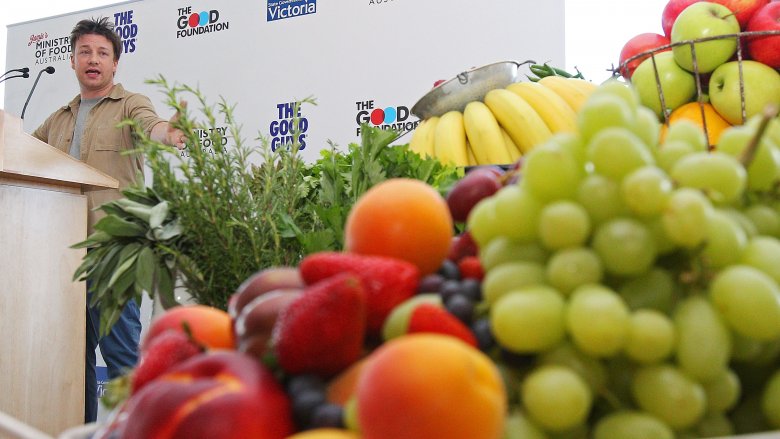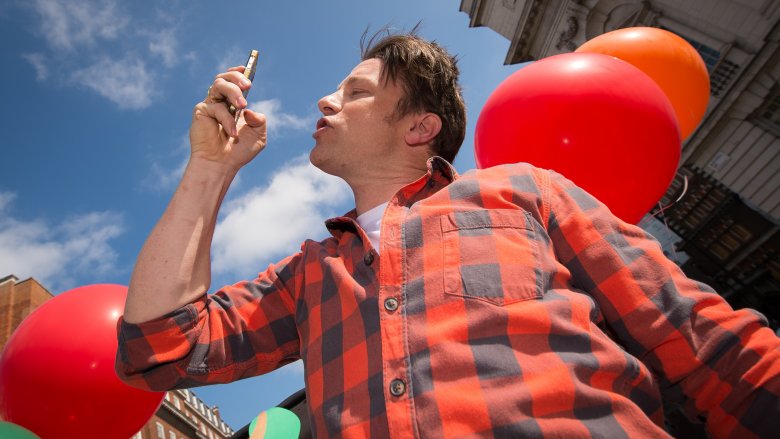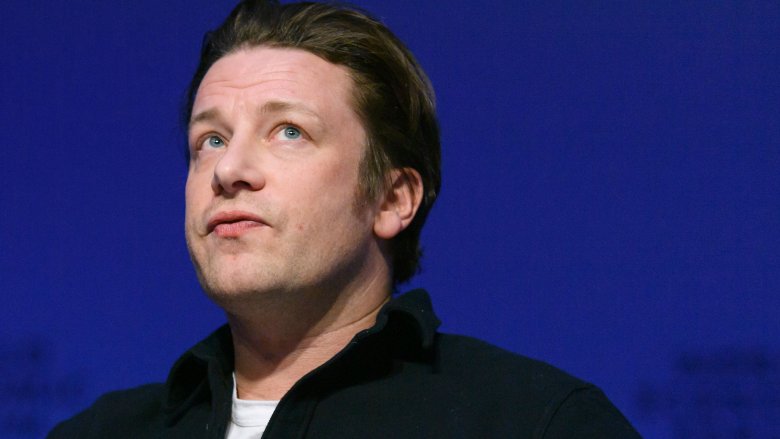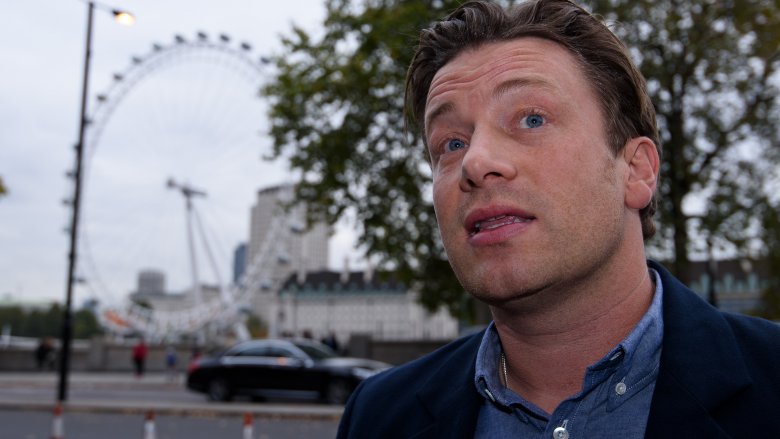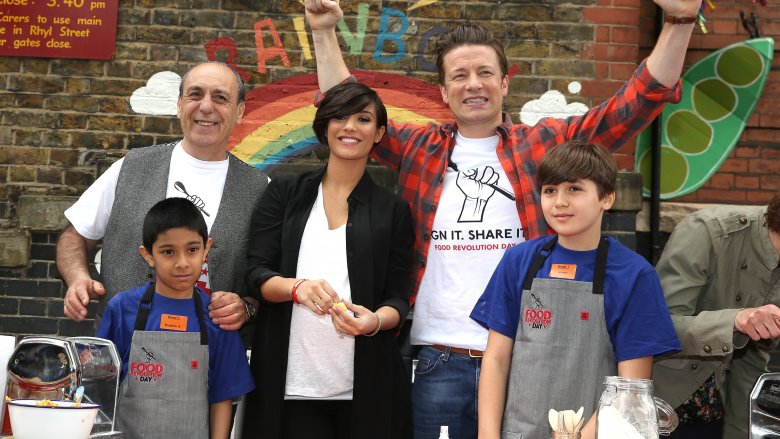All The Times Jamie Oliver Made Everyone Angry
Being a celebrity chef isn't all about the cooking, although that's certainly a huge part of it. You also need to have a big personality, light up the television, and get everyone's attention. You want people to listen to what you have to say, after all, and part of getting your message across is getting people to respect you, your opinions, and your abilities.
For some inexplicable reason, Jamie Oliver seems to have missed the memo.
He shot to fame and stardom after the debut of his first show, The Naked Chef, on BBC 2 way back in 1999. The name alone got your attention, right? By the time you tuned in and he explained the "naked" referred to his food and cooking style, not actually him, you were probably already hooked. Fans attribute his success to his super-friendly personality, but sometimes, that familiarity has led him to go just a little too far.
Oliver has a shocking track record of making people very, very angry, and often the anger is for good reason. You know, like the time some of his unfounded comments cost hundreds of jobs? Yea, that happened. Sometimes, the only thing left to ask is, "Why on earth did you think this was a good idea?" These are the time Jamie Oliver has made way more enemies than friends.
When West Virginia ate Jamie Oliver for lunch
Jamie Oliver started his Food Revolution show with the best of intentions: go into school districts and help them feed kids right. But when he headed to Huntington, West Virginia in 2009, well, they weren't happy to see him.
It was just after the city had been named the unhealthiest in the country, and no one really wanted him putting them under the spotlight. According to the Huffington Post, locals just didn't want someone berating them into eating healthy.
Oliver's comments — like, The Atlantic says, when he told a mother she was killing her kids — succeeded in getting some serious hate thrown Huntington's way. The school's food service director was bombarded with hate mail, and everyone was calling for her resignation. She was the bad guy, but here's the thing — after Oliver swept through and made his changes, the school was worse off. A whopping 77 percent didn't like or eat lunch anymore, and many were throwing it away. That's a huge problem, because Huntington — a town devastated by a collapse in their manufacturing sector — relied on school lunches to feed their kids. With no one buying lunches, staff started to get laid off. Oh, and the food didn't meet the US Department of Agriculture's standards because it was too high in fat.
The punchline? By 2017, McCoy had ditched Oliver's changes, revamped the school menu herself, and made it a healthy one — that kids would actually eat.
When Jamie Oliver thought he knew it all about breastfeeding
Jamie Oliver and his wife, Jools, have a fairly large brood of children, and in 2016 he made some comments that made it clear he believed his fatherhood made him qualified to tell the women of the world just why they needed to start breastfeeding their babies.
He remarked (via Good Housekeeping), "If you breastfeed for more than six months, women are 50 percent less likely to get breast cancer. When do you ever hear that? Never. It's easy, it's more convenient, it's more nutritious, it's better, it's free."
While some were quick to point out that more breastfeeding mothers need to be given proper resources, others condemned the fact that he called it "easy."
For many women, it's not a choice they can make. There's a lot of reasons women decide not to breastfeed, and for some, it's just physically impossible. Victoria Young wrote in The Telegraph about not just the difficulties she had, but the guilt and feelings of inadequacy that were devastating to her — and why Oliver needed to keep his mouth shut on the subject. Women all over called Jamie Oliver out because of his comments, which were exactly the type that made countless women feel bad about something they couldn't help.
The recipe that got Jamie Oliver targeted with death threats
In 2016, Jamie Oliver shared his recipe for paella on Twitter. Paella, for anyone not up on their Spanish cuisine, is typically made with shellfish (particularly clams and mussels), shrimp, fish, various vegetables, and served over seasoned rice. Oliver made a big deal of his inclusion of chorizo, and social media was outraged.
To many in Spain, it wasn't just a bad recipe — it was taking a dish that embodied their culinary landscape and turning it into what The Independent says some were calling "rice with stuff." One tweet summed up the controversy succinctly: "this is an insult not only to our gastronomy but to our culture." Add in the fact that Oliver's recipe came during massive political upheaval across Spain, and that didn't help the rage... but it did help unify an entire country against him.
Later, Oliver appeared on The Graham Norton Show, and of course, the topic came up. Norton read some of the angriest tweets, and according to Oliver, it got so bad he had gotten death threats over the ill-advised recipe. Did he apologize? He had this to say: "By the way, just FYI, it tastes better with chorizo."
When Jamie Oliver didn't know how to kill... and did it anyway
We all know where meat comes from, but that doesn't mean we want to see something go from a living, breathing creature to our plate... especially if it happens badly, and well before most kids are in bed.
On British television, the watershed is 9 p.m. — that's the time channels can start showing programming that's a little more adult. Before the watershed, there's no graphic violence, offensive language... you get the idea. That's when the kids are watching, after all, and in 2005, Jamie Oliver brought some graphic, pre-watershed violence to the television.
It was an episode of Jamie's Great Escape, which showed him slitting the throat of a still-conscious lamb. He remarked (via the Evening Standard), "A chef who has cooked 2,000 sheep should kill at least one, otherwise, you're a fake."
It doesn't matter how legit that idea is, there was another big problem with the scene. Not only did it air at 8:30 p.m., but animal rights campaigners had a huge problem with the fact the lamb was very clearly conscious and aware of what was happening. Advocates for Animals called it a "brutal slaughter [with] no compassion or respect for the animal", while Mediawatch pointed out the likelihood that children had been watching.
When Jamie Oliver banned BOGO in Scotland
Everyone loves a BOGO deal, right? Well, everyone except Jamie Oliver.
Scotland is making some serious moves to put an end to childhood obesity, but when they unveiled some of their plans in 2018, a lot of people weren't happy with a plan Jamie Oliver championed: the end of two-for-one promotions on foods high in fat, salt, and sugar — and there's a reason it upset so many people. Clearly, wrote The Independent, it's not the people like Oliver (who was worth almost $500 million at the time) who were buying BOGO deals on, say, pizzas that were just OK. Most of the people buying those things were ones that couldn't afford anything else, and, they argued, instead of making bad food more expensive, what they should be doing is making good food cheaper.
The New Statesman's expletive-filled headline summed it up best, while those on social media were condemning him for making food more expensive and not campaigning to make better food more affordable. Class snobbery at its finest, they called it, and it was the huge percentage of people suffering under inflation, welfare cuts, and stagnant wages that were going to be the most impacted.
When Jamie Oliver's pink slime comments left 700 people unemployed
You've heard of "pink slime," right? Did you know you can thank Jamie Oliver for coining the phrase? That's according to a $1.2 billion lawsuit filed against ABC for airing the episode of Food Revolution where he made the comments.
The lawsuit was filed by Beef Products, Inc., a processing firm in South Dakota who had their products targeted and condemned as being filled with ammonia as part of the process. It had catastrophic consequences for the company — stores started dropping their products, and that led to an 80 percent drop in sales. Three of their four plants were closed, and 700 people lost their jobs.
And according to The Independent, a huge part of the problem was Oliver's claims that the meat was "not fit for human consumption," and full of bacteria like E. coli. They also weren't happy with his demonstration of how meat was processed — using a washing machine and household ammonia. All of that, the company said was grossly misleading.
Surprisingly, Oliver wasn't even named on the lawsuit, which Business Insider says ABC and Disney paid $177 million to settle.
When Jamie Oliver hooked up with Shell for a hefty payday
Stop by a Shell service station in the UK, and you're likely to see something surprising: the Jamie Oliver Deli. Oliver worked with the gas giant to create — and sell — around 80 different products, but not everyone is impressed with the partnership. When it was announced in 2018, environmental groups were quick to call him out on the apparent hypocrisy.
Shell, The Guardian says, has been linked to everything from destroying the environment and egging on climate change to involving themselves in billion-dollar bribes (which Shell denies). But given that Oliver has been lauded by the UN for his work as an "environment champion," it seems like the two are completely at odds... and that's led people to accuse him of selling out for a nearly $6.3 million payday.
Oliver addressed the controversy by mainly pointing out that he was making food available to people, saying (via ITV), "I think I've earned trust over the last 20 years and I would hope that people think I've thought about it correctly. [...] My job's to work for the British public and push Shell to be the best we can be and also to disrupt the market."
When Jamie Oliver clearly didn't get what poverty is really like
In 2013, Jamie Oliver was kicking off a new show called Save With Jamie. That's all well and good, but in the run-up to the show he made some shockingly tone-deaf statements about poverty... while, critics were quick to point out, enjoying having a net worth of millions and millions... and millions.
Among the comments that raised particular ire was his condemnation of a family struggling to make ends meet, who were eating "chips and cheese out of Styrofoam containers, and behind them is a massive TV," leading Oliver to suggest they didn't have their priorities right.
Jack Monroe from The Independent called the comments "not only out of touch but support[ive] of dangerous and damaging myths," but it didn't stop there.
Oliver went on to lament how he couldn't transport Britain's poor to the Mediterranean, where he claimed even the poorest people ate really, really well. He sang the praises of mussels and pasta and fresh tomatoes, while ignoring the fact that in 2010, more than 100,000 of Barcelona's entire population were using food banks for even the basics — and that's a percentage three times higher than Britain saw at the time Oliver was talking. The New Statesman said that many couldn't even afford to cook what they'd been given, replying on "social dining rooms" to serve them their hot meals after their gas and electricity were cut off.
They warned, "poverty isn't picturesque by the Mediterranean either."
When farmers weren't happy about being forced to pay Jamie Oliver
It's not just people in his native Britain that have a problem with Jamie Oliver, and in 2014, he outraged Australia after he teamed up with the grocery store Woolworths for an advertising campaign promoting the importance of produce.
That's not offensive in itself, but according to The Guardian, problems started when it came out that the cost of the campaign was being passed along to the farmers and growers it was supposed to be benefiting. They were being charged 40 cents on each crate of vegetables, and that adds up fast. One farmer found himself faced with owing about $200,000 USD over the course of the six weeks the campaign was running. Representatives appealed to Oliver to side with the farmers and ask Woolworth's to stop requiring the payments.
Smart Company says that Oliver responded he was just an employee of the company and didn't have any say over business decisions, while Woolworth's said the payment was completely voluntary. After an investigation by the Australian Consumer and Competition Commission Woolworth's was cleared of wrongdoing, to the outrage of many farmers and their representatives.
When Jamie Oliver made money off the companies he condemned
When Jamie Oliver took a stand against the way in which many commercially sold chickens have historically been raised, he made it clear he was really against it. According to The Independent, he declared "the conditions under which standard eggs and chickens are reared are morally wrong," and called on viewers to change the way they shop to put pressure on the industry to be more responsible.
Where's the problem? That came when it was revealed he had signed a multi-million-dollar deal with the massive UK supermarket giant Sainsbury's. Animal Aid put it this way: "If he's going to lecture the public he needs first to stop profiting from animal exploitation."
While Sainsbury's confirmed they had plans to move to conform to food standards put forward by the RSPCA by mid-year, they also said that only applied to eggs, and they had no such plans in place regarding the 90 million chickens they sold annually.
Later that same year, Sainsbury's announced (via The Telegraph) that they were expanding their animal welfare programs to cover chickens, too — which Oliver partially took credit for.
When Jamie Oliver made Iceland mad
Jamie Oliver is an equal opportunity annoyer, and in 2017 it was much of Iceland who was taking issue with him.
It started when he posted a photo of the place he was sourcing salmon from for his new restaurant: the Arnarlax salmon farm. What followed was a deluge of comments condemning his support of the controversial farm. One of the biggest problems environmentalists and farmers had with Arnarlax was that they had imported Norwegian salmon, and there were serious fears that the fish would escape and do permanent damage to the environment and native species.
While Oliver's social media team worked to reassure concerned posters that the farm was chemical- and antibiotic-free and that they were confident they shared the same "ethos," The Reykjavik Grapevine says that wasn't the end of it — others were pointing out that if he was going to open a restaurant in Iceland and use Norwegian salmon, he'd better plan on facing some massive boycotts.
When Jamie Oliver took aim at sugar
In 2018, the UK kicked off a campaign to try to lower the amount of sugar in their citizens' diets. The so-called sugar tax would raise the price of soft drinks, and it goes without saying that Jamie Oliver was one of the campaign's staunchest supporters. Not long after the price hike kicked in, The Telegraph reported he was already campaigning for extending the products covered to include other high-sugar foods, but way back when he started celebrating his war on sugar — back in 2016 — people were quick to point out that he really should practice what he preached.
A quick look at the recipes on his website showed an almost insane amount of sugar, right in plain sight. Many of his drinks called for tablespoons of sugar per drink, his "Children's Party Cake" contained three times the recommended amount of daily sugar per slice, there was a "healthy" breakfast that had more sugar than a bowl of Frosties, and he had a gammon ham he advised cooking in four liters of cola.
Do you think people started finding high-sugar recipes and posting the results on social media? You bet they did!
When Jamie Oliver took away Turkey Twizzlers
What the heck are Turkey Twizzlers? They're questionable spirals of meat that all the kids love, and in 2005, Jamie Oliver made a ton of schoolchildren very sad when he got them removed from school menus across Britain. According to the BBC, they were an early target in his campaign against childhood obesity, and after preaching about just how unhealthy they were, Scolarest — the firm that supplied lunches to around 2,000 British schools — dropped them from the lineup.
But, a few things happened after that. The Guardian pointed out the hypocrisy that emerged in 2008, when the chef's new pasta sauce hit shelves... and when they weren't allowed to be served in schools because of the high salt content. How much salt? A primary school-age child would get most if not all of their daily recommended salt after eating just a quarter of a can. Oliver said you were supposed to water down the sauce to feed up to six people out of a can, but parents weren't thrilled with the betrayal of trust.
Fast forward to 2018, when Vice reported that there was a petition going to bring back the weird, 34-percent turkey spirals. Thousands of people had signed, and while nutritionists were saying that they definitely weren't the best thing to give kids on a regular basis, the occasional Turkey Twizzler wasn't going to hurt anyone.
